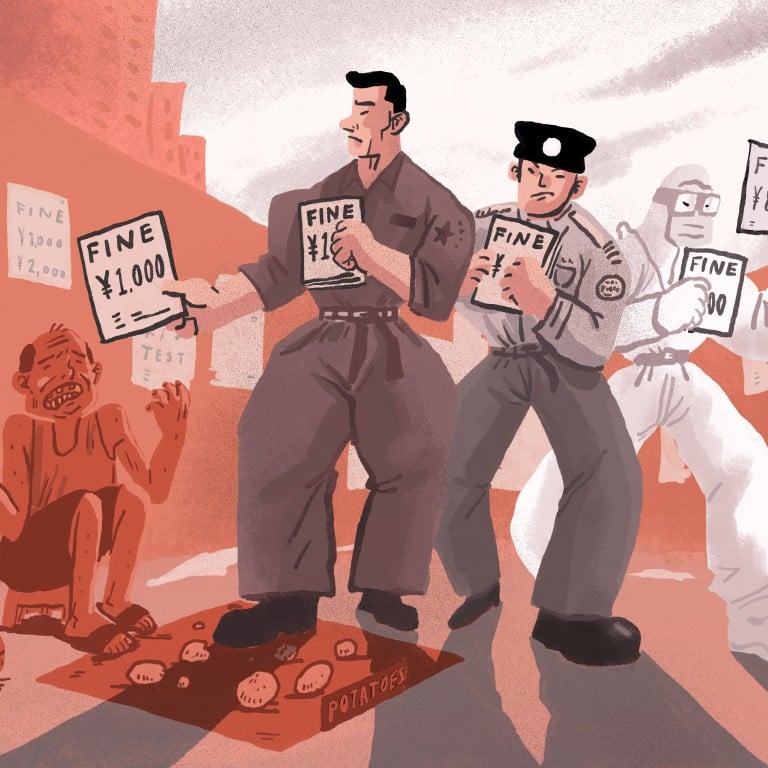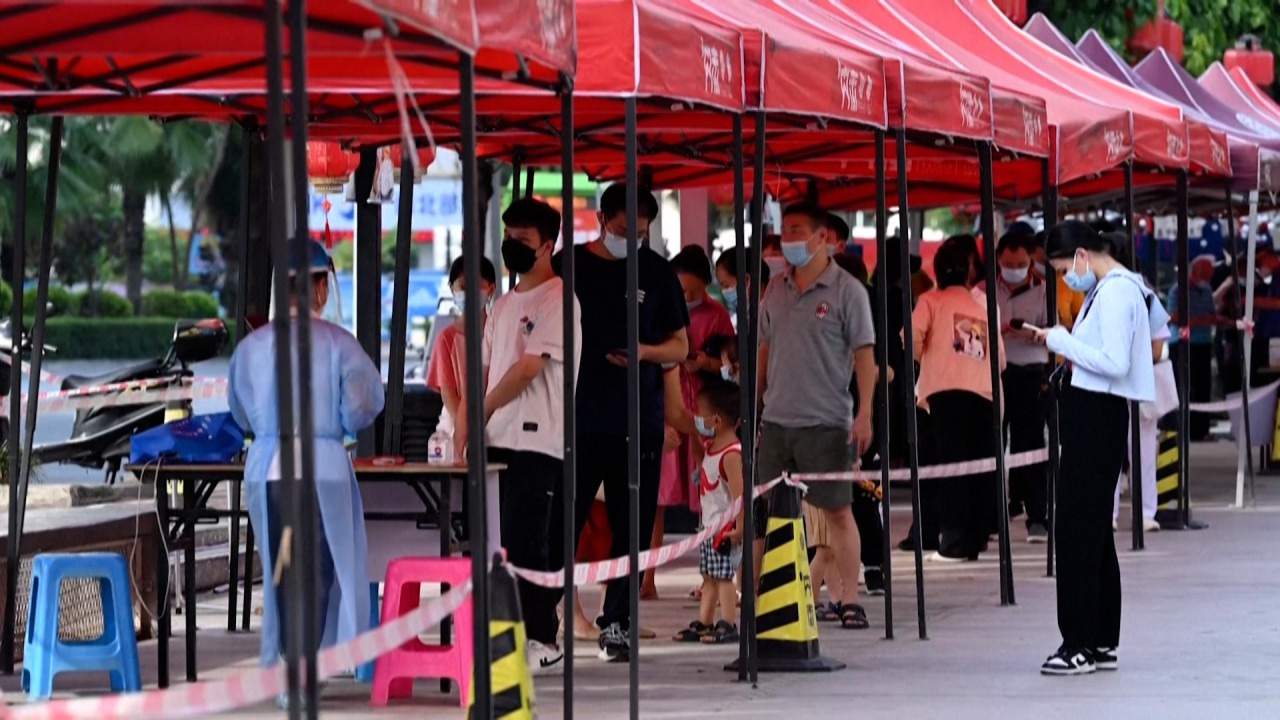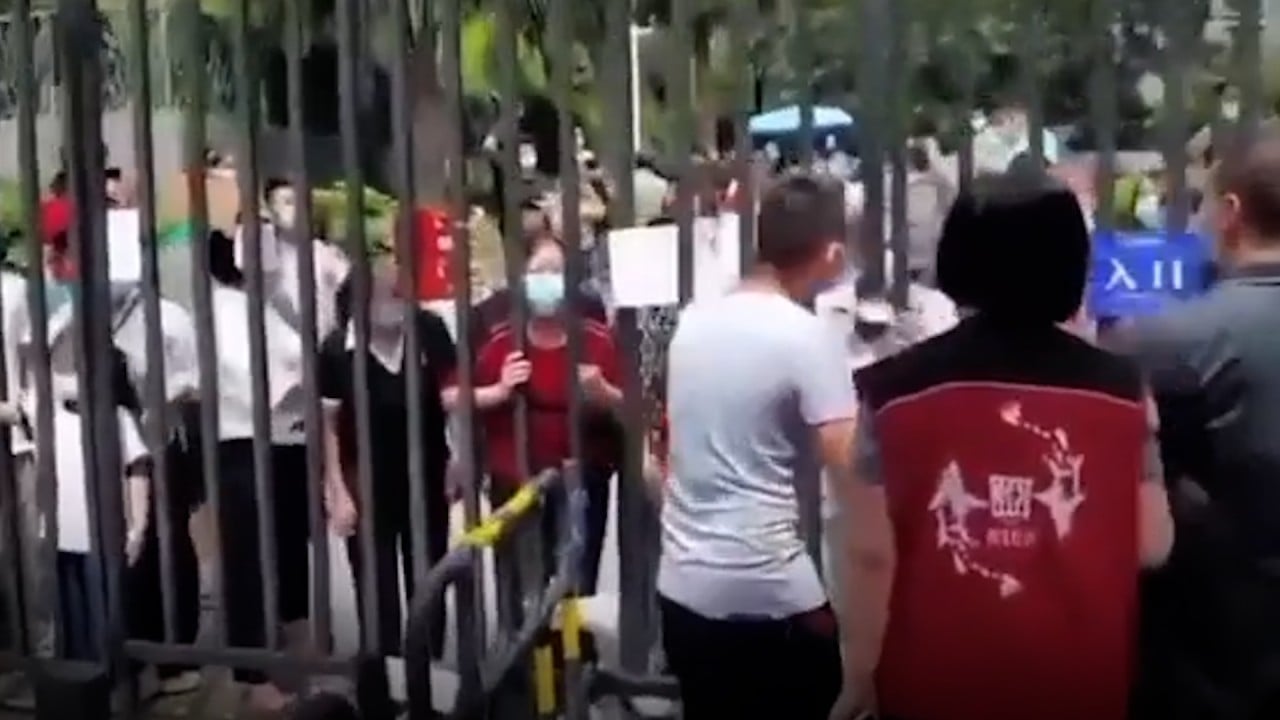
China’s fiscal woes highlighted as local authorities turn to fines, traffic tickets to boost revenues
- Local authorities are struggling with slashed revenues resulting from the property sector slump as well as tax rebates as part of efforts to help virus-hit businesses
- Tax revenues from corporations in the first seven months of the year fell by 13.8 per cent from a year earlier to 10.27 trillion yuan (US$1.48 trillion)
A 66,000 yuan (US$9,525) fine for selling substandard celery and a 300,000 yuan (US$43,300) penalty for “jacking up” the price of potatoes may sound extreme.
But unreasonable heavy fines have become an increasingly common measure as local governments in China seek to bring in much needed revenue, revealing the tip of the iceberg for China’s fiscal predicament.
As a grim outlook looms for China’s economy in the face of multiple headwinds, local authorities already stretched thin by the seemingly never ending coronavirus outbreaks are struggling to keep their fiscal balance sheets clean. Revenues fell short of expenditure in all of mainland China’s 31 provinces, municipalities and autonomous regions in the first half of the year.
As China’s economic growth lags, authorities have been struggling with slashed revenues resulting from the property sector slump as well as tax rebates they need to pay as part of efforts to help virus-hit businesses.
They are also struggling under the burden of increased expenditures caused largely by coronavirus-related spending, including the costs of mass testing and social restrictions.
The massive tax cuts and rebates this year aimed to support businesses came at the expense of local public finance
Slowdowns in local economies have led to declining tax revenues from corporations, and in the first seven months of the year, income from the crucial source fell by 13.8 per cent from a year earlier to 10.27 trillion yuan (US$1.48 trillion), according to the Ministry of Finance.
“The massive tax cuts and rebates this year aimed to support businesses came at the expense of local public finance, with value-added tax, an important source of revenue, down by more than 40 per cent,” said Xu Tianchen, an economist with The Economist Intelligence Unit (EIU).
Land sale revenue, a major local government financing tool which usually accounts for a third to a half of revenues, fell by a record 31.7 per cent during the first seven months of the year.
“The current downturn in the property market means that local governments couldn’t count on land sales to fill the fiscal gap,” Xu added.
Slashed revenues and an increase in expenditure left China with a 5.3 trillion yuan deficit in the first seven months of the year, with coronavirus-related expenses seen as a major contributor.
Financial toll from China’s zero-Covid policy hangs over local services
Goldman Sachs estimated in May that testing 70 per cent of the population every two days would cost as much as US$370 billion, or 2.2 per cent of China’s economic output last year.
Soochow Securities estimated that the cost of regular coronavirus tests in all first and second-tier cities would cost as much as 1.7 trillion yuan a year, accounting for 8.7 per cent of public expenditure, or 1.5 per cent of China’s gross domestic product (GDP) in 2021.
Provinces including Sichuan, Shaanxi and Yunnan have all started to charge people for virus tests, although it still remains free for most of the country.
Growth forecasts for China’s economy this year have been slashed by global investment banks to between 2.6 and 3.3 per cent, while Beijing has already conceded that its annual growth target of “around 5.5 per cent” may be missed.
Local governments should tighten their belts, put existing assets to better use, maintain a balance between revenue and expenditure, and guarantee fiscal spending to ensure people’s livelihoods
And in the second half of the year, the task to lift economic growth is largely in the hands of the local governments while China has been ramping up infrastructure spending.
In the first seven months of the year, infrastructure investment grew by 7.4 per cent, with outlay on water conservancy projects growing by 71.4 per cent over the same period compared to last year, Ministry of Finance data showed.
Meanwhile, this year’s central government transfer quota to local authorities has almost been used up, along with the quota for special purpose bonds dedicated to fund infrastructure projects, meaning Beijing has little more help to offer.
“Local governments should tighten their belts, put existing assets to better use, maintain a balance between revenue and expenditure, and guarantee fiscal spending to ensure people’s livelihoods,” Premier Li Keqiang said in a meeting last month.
Weakened revenue growth momentum is likely to lead to more front-loaded spending measures for local governments to shore up the economy, said Susan Chu, senior director at S&P Global Ratings.
“We expect the fiscal deficit over total revenues for China’s local governments to be 20 to 25 per cent for 2022, compared with 11 per cent in 2021 and 16 per cent in 2020.
“Over the longer term, we anticipate the goal to contain fiscal risks will be prioritised over the need to boost growth through investment.
“We believe the central government is unlikely to significantly increase the quota for new bond issuance by local governments, which would force them to run down internal cash or liquid assets.
“The reduced liquidity buffer and fewer fiscal resources point to spending cuts, and will likely exert secondary impact on the local economy.”
Since last year, a growing number of cities have been banking on fines to increase their fiscal revenue.
China to sell US$230 billion of local debt as fiscal income slumps
According to public data compiled by the Guangzhou-based Southern Weekly newspaper, last year local government revenue from fines and money confiscated from illegal sources including pyramid schemes increased in 80 out of 111 cities, representing 72 per cent.
Revenue from fines and confiscations more than doubled in 15 cities, with Leshan in Sichuan province rising by 155 per cent. Nanchang, the capital city of Jiangxi province, saw its revenues increase by 151 per cent.
Last month, a grocer in Yulin, Shaanxi province, was fined 66,000 yuan (US$9,525) by local authorities for selling 2.5kg (5.5lbs) of substandard celery for 20 yuan (US$2.9).
Last year, Yulin collected 58.7 billion yuan in revenue, while spending 80 billion yuan, pushing its debt ratio to 123 per cent.
In Daqing in the northern province of Heilongjiang, a potato vendor was fined 300,000 yuan (US$43,300) for “jacking up” his prices by over 66 per cent after charging 4 yuan per kilogram, according to public records and state and local media reports.
Given the depressed economic outlook, the fiscal problem will remain in the months, if not years, to come, especially in smaller cities and counties with already poor public finance and net population outflows
In 2021, the total fiscal expenditure was nearly twice as much as the fiscal revenue in Daqing, while the local government debt ratio stood at 266 per cent.
The excessive fines occurred because local governments still have too large outlays, but have much less at their disposal, added Xu from The EIU.
“Given the depressed economic outlook, the fiscal problem will remain in the months, if not years, to come, especially in smaller cities and counties with already poor public finance and net population outflows,” he said.
“This means authorities there will do whatever they can to tighten their belts and tap into unconventional revenue sources like fines.”
Police in many cities have doubled down on issuing traffic tickets, and across the country, more check points have been set up to fine drivers and passengers for not fastening their seat belts and other related violations.
Covid-19, property, heatwaves erode recovery as China’s GDP forecasts cut
According to a report from the China Youth Daily newspaper, in Chengwu county in Heze city in Shandong’s southwest, truck drivers can pay for a “monthly pass” of 1,000 or 2,000 yuan to be free from further fines in the event of any future traffic violations.
In 2021, Chengwu county collected 1.3 billion yuan in fiscal revenue, compared to an expenditure of 4.3 billion yuan.
If the desperate measures continue to increase, potential consequences include deteriorating levels of public services, sporadic protests, and eventually, defaults on local government debt, Xu said.
“From a macroeconomic perspective, since the public sector as a whole is a large employer in China, the ongoing fiscal strain could erode the income of employees in the sector, which will translate into even lower consumer spending,” Xu added.
“A short-term imperative would be to stem the spread of the ongoing crisis. To that end, China will need to normalise its revenue stream, reboot its property market and have the central government to bail out some of the distressed localities.
“The long-term theme will be fiscal consolidation. For example, governments and public facilities in smaller administrative units are likely to be merged to save costs. Government mandates could be gradually narrowed to focus on basic public services and pivot away from generous investment projects.”
‘Magnitude’ of subsidies, tax cuts questioned, too small to aid China’s car sales
In Hequ county in Shanxi province, two thirds of public servants have been effectively laid off, bursting the bubbles of the so-called iron rice bowl from an occupation which traditionally had guaranteed job security.
Dancheng, a county with a population of 1.37 million in central Henan province, suspended bus services last month, while multiple bus lines in Boluo county in Guangdong province have also been slashed or suspended due to financial stress, according to a Caixin report.
Ultimately the solution has to come from the recovery of the local economy, otherwise the current economic and fiscal challenge can only be resolved by helping the economy to rebound to its potential
“Down the road, the local government potentially may sell more assets to deal with this kind of a fiscal pressure,” said Zhang Zhiwei, chief economist at Pinpoint Asset Management.
“Local governments have state-owned enterprises, they have assets, they also have cash flow generating business, the highway, for instance. Those assets potentially can be sold to help deal with the fiscal pressure.
“But ultimately the solution has to come from the recovery of the local economy, otherwise the current economic and fiscal challenge can only be resolved by helping the economy to rebound to its potential.
The burden of additional spending to contain the coronavirus could also risk the long term sustainability of local government fiscal conditions, squeezing the rest of the expenditure and the welfare of the economy, Zhang added.
He added that while it still needs more data to analyse, it is worth paying attention to the crowding out effect coronavirus-related expenses have on pension and healthcare in the long term.
A Ministry of Finance report published last month on the implementation of fiscal policies in the first half of the year urged governments to tighten their belts by paying close attention to their budget implementation, prioritising essential expenses and ensuring that key expenditures, including teachers’ salaries and pensions, are paid on time.
As for the fines handed out by the local authorities, a local media report from late last month said that the potato vendor hit with a 300,000 yuan penalty in Daqing in the northern province of Heilongjiang was planning to appeal against the penalty.
The report added that he paid 60,000 yuan a year to rent the storefront, and that he had sold more than 2,000kg of potatoes at 4 yuan per kilogram.



